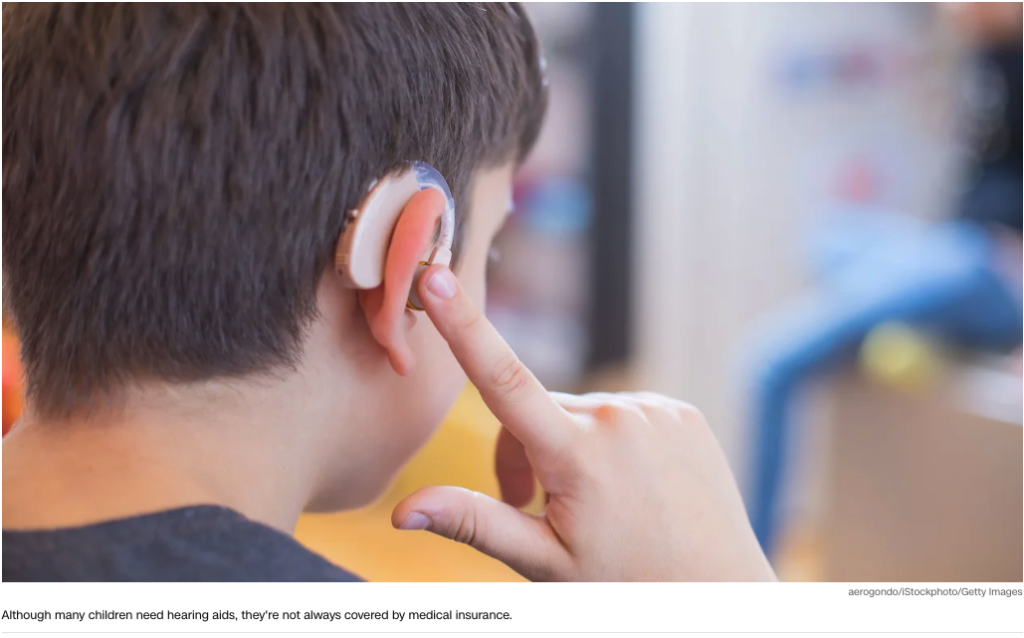As published on CNN.com by Sam Sider on September 27, 2023.

When Michelle Marciniak’s daughter Marie was 4 years old, a preschool teacher noticed a change in her behavior. She was losing speech skills and crying during circle time with the group.
Her parents found out their daughter had not been able to hear them for six months because of damage from a virus.
“We were devastated that my baby had not heard the words ‘I love you’ for six months from the two people who loved her the most,” said Marciniak, of Orange County, California.
Hearing loss affects thousands of children each year and is one of the most common conditions present at birth, according to the US Centers for Disease Control and Prevention. The National Institutes of Health says that about 2 or 3 of every 1,000 children in the US is born with detectable levels of hearing loss in one or both ears.
Marciniak says the problem was made worse when they learned that her daughter needed hearing aids, but insurance companies in California are not required to cover them.
“We were told hearing aids for children were considered ‘cosmetic’ or elective by the insurance company. I could not understand it,” she said.
A pair of hearing aids can run about $6,000, and children typically require new ones every few years throughout childhood.
Marciniak says she and her husband were able to afford them, but she has met with many other parents who said the cost would bankrupt their family their child would have to go without. Without treatment, hearing loss can affect children’s ability to develop speech, language and social skills, the CDC says.
Marciniak joined with other families to form a grassroots group called Let California Kids Hear, with the goal of getting the most populous state in the nation to require insurance companies to cover hearing aids for children from infancy to 21 years old.

From left, Lydia Sussman, Idina Menzel and Michelle Marciniak attend a Let California Kids Hear Campaign in Los Angeles in 2019.
Hearing aid mandates exist in at least 26 states. New York, Hawaii, Nevada and Arizona are all considering similar legislation this year.
Marciniak and Let California Kids Hear helped get a bill on the floor of the California Legislature in 2019, but it was put aside amid opposition from insurance companies. The California Association of Health Plans opposed the bill out of concern that premiums would go up.
In 2021, Gov. Gavin Newsom’s administration set up a program to help fund hearing aids, but only for families who met income eligibility guidelines and had no or limited insurance coverage.
The state of California says it spends an estimated $400 million every year educating 14,000 children who have deafness or are hard of hearing.
Let California Kids Hear and its affiliated doctors say some of those costs could be mitigated if children had access to hearing aids early on.
Dr. Daniela Carvalho, a pediatric otolaryngologist at Rady’s Children’s Hospital-San Diego, said that the state program was not a sufficient solution and that thousands of children are still going without necessary hearing aids. Even with years of speech therapy and special education, they’re at risk of continued delays and mental health problems.
“These children, without access to hearing aids, will have significant delays in speech, academic delays and social interaction,” she testified in July before the California State Assembly in support of a new Senate bill. “Pediatric hearing loss is a developmental emergency.”
This year, the Legislature passed Senate Bill 635, which says insurance companies must include coverage for hearing aids for all enrollees under 21 if medically necessary.
“The only thing left is for the governor to sign it,” Marciniak said. “I don’t see what would stop him for helping thousands of children in the state who need hearing aids.”
Newsom’s office said it doesn’t typically comment on pending legislation, and the governor has until October 14 to act.
As for Marie, after getting her hearing aids, she sprang back to her old self. She is now 13 and learning right alongside other children of her age.
“She is doing great. But it could have been a very different story without those hearing aids,” Marciniak said.